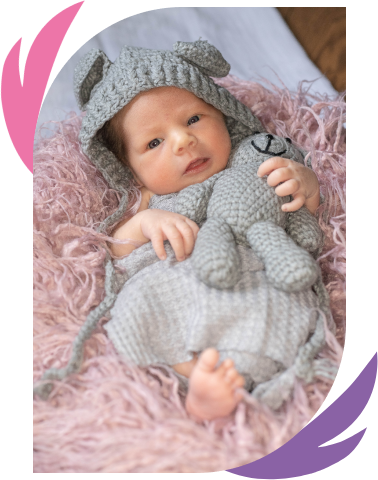
First of all let’s start from the basics and understand what exactly is Egg Donation.
What is Egg Donation?
Egg donation is a process whereby a young woman (donor) gives out her eggs or oocytes to another woman (recipient) to help her get pregnant. It is one of the most crucial aspects of assisted reproductive technology (ART).
In this procedure, a doctor collects an oocyte or oocytes (eggs) from the donor, fertilizes them in a lab, and transfers the embryos produced into the womb of the egg recipient. This is done through a clinical procedure, called IVF (in vitro fertilization). At times, the reproductive experts at the fertility center may freeze all of the eggs immediately or will freeze some of the resultant embryos for use in the future or implantation in other women.
Egg donation helps women who are unable to conceive with their own eggs for different reasons, such as advanced reproductive age, ovarian failure, and preventing congenital disorders in the baby. In addition to infertile women, oocyte donation also helps single individuals and LGBTQ families become parents.
According to a 2014 study published in the Fertility and Sterility journal, 93% of fertility centers in the U.S. now offer oocyte donation. This study also shows that the procedure leads to a live birth at least 50% of the time.
In this piece, we will discuss the requirements for selecting an Egg Donor, the actual procedure, and the legal implications of oocyte donation.
How to Donate Eggs
A woman can donate her eggs in three different ways:
1. Egg Donor Agency or Egg Bank:
Agencies are always looking for suitable candidates and can offer higher pay based on the specifics of the donor. It is important to know that egg donor compensation varies from agency to agency. The right compensation for donors needs to be based on the cost of living in her area and must include her lost wages, parking, mileage, and other expenses incurred in the course of the donation.
For instance, donor compensation in the Washington DC area is between $6,000 and $8,000. However, Lucina Egg Bank offers an opportunity to earn between $8,000 to $15,000 for your contribution.
2. Fertility clinic:
You may also search for a clinic or agency offering oocyte donation by yourself without waiting to be sought out by them.
3. Direct oocyte donation:
Another great option is directed oocyte donation. In this case, the donor donates eggs directly to a friend or family member without involving a clinic or agency. Intended families who have certain requirements may place an ad in a popular newspaper, magazine, or online and can pay up to $25,000 to $50,000 for the donation.
Egg Donor Requirements and Qualifications
- Be within the ages of 19 to 31
- Have sound health, both physically and emotionally
- Have a BMI in the range of 18 to 28 (being underweight or overweight can impact egg quality)
- Must not have smoked cigarettes in the last 12 months
- Have regular menstrual cycles
- Not presently using Depo-Provera, Nexplanon, Norplant, or any other brand of hormonal IUD
- Have not been to a Zika-infected country or countries in the past 6 months
- Be ready to go through a medical and psychological evaluation
- Be ready to use injectable hormone medications
- Have not had a sexually transmitted disease in the last 12 months
- Have no prior history of drug use (urine tests will be done during the donor screening process)
- Be available for about 5 to 10 clinic appointments (you may have to travel for days if your clinic is far away from your state of residence)
- Avoid getting tattoos or body piercings within the 6 months before commencing an egg donation process and when going through the cycle.
- Be ready to be listed with the agency as an available donor for 6 months, at least.
- Have not completed more than 6 donation cycles in her lifetime, which is in accordance with the guidelines released by the ASRM (American Society for Reproductive Medicine).
Egg Donation Process
1. Egg Donation Application
The egg donation process begins with an online application involving the donor’s personal health history (i.e., BMI), family history, demographic data, etc.
If the donor gets accepted, the fertility clinic/agency will invite her and examine her ovarian function through her hormones and transvaginal ultrasound.
This is followed by a comprehensive clinic visit during which a nurse will
- Review the donor’s history
- Discuss the consent process and possible risks
- Conduct genetic testing and infectious disease blood work and
- Perform a urine drug test.
She will also carry out a psychological test and teach the prospective donor how to self-administer injections at home.
Then, there will be a one-on-one session with a mental health expert.
2. Initial Screening
Once you have conducted your research and decided that the fertility clinic or agency is one you want to partner with, they will begin their screening process.
This is done to find out if you are a suitable candidate for oocyte donation and to help the hopeful parents get the information they require to select the ideal donor for their family.
Below is a short overview of what to anticipate during the screening and intake process.
3. Medical Examination and History
The doctor will check the donor’s ovaries for the ability to make eggs via blood tests and physical/pelvic examination.
The donor may also need to undergo a vaginal sonogram on day 2 or 3 of her period to determine ovarian reserve and function. The medical and physical examination you will have to undergo will be similar to your regular well check and pap test, just that it may be a little more detailed.
You should be ready to answer plenty of questions regarding your personal health as well as your family’s health. You will share information about the physical and mental health of your genetic parents, siblings, and even grandparents. Also, you will have to be completely honest about your drug use or any risky sexual behavior in the past.
This step of the egg donation process can be difficult if you are an adopted child or if you are out of touch with your own family. Family medical history is very important, which means that you may be unable to proceed with the donation if you cannot supply this information.
4. Personal History
Selecting an Egg Donor is a complex, emotional process for them. The intended family that picks interest in you may want to know a lot of things about you, including your
- Physical features
- Hobbies
- Educational goals and
- Achievements.
The intended family may be searching for a donor who is like them or may have certain requirements for selecting a donor, but the point is that they will try to know “who you are” through your answers to some personal questions.
5. Blood Work
There is going to be basic blood work to assess your general health, as well as fertility-specific testing. You will undergo tests for infectious diseases like HIV, hepatitis B, and hepatitis C.
The clinic or agency may also ask you to do genetic testing if the sperm donor or intended father is a carrier for a heritable disease. This testing typically costs thousands of dollars and you will receive it free as part of your donation screening.
6. Pelvic Ultrasound
Ultrasound is conducted to assess your fertility potential and ovarian health during the screening and to monitor the stimulation of your ovaries during the egg donation cycle itself.
It is possible that you have not had a transvaginal ultrasound before.
Basically, it involves an ultrasound machine and a small transducer wand, which is introduced into the body through the vagina. The technician uses this wand to produce ultrasound images of your ovaries, uterus, and other organs in the pelvic region.
Ultrasounds are not painful, they can be a bit uncomfortable. You will have to undergo a transvaginal ultrasound before you are allowed to be an Oocyte Donor.
You are going to have many of these exams over the course of your donor cycle.
7. Psychological Screening
The main reason for this is to ensure you understand the egg donation process and the associated risks. It also helps you think carefully about the ethical and emotional aspects of the donation.
You can undergo psychological testing to confirm that the donation will not impact your mental health and to prevent the transmission of genetic, or mental disorders.
Agencies may also request that you undergo IQ and personality testing. This is an extra piece of information the intended family can use when choosing their donors.
Certain aspects of oocyte donation can be emotionally troubling. For instance, unless it is a known or open donation (where the donor and egg recipient may still maintain contact after donation), you are not likely to know what occurs to your eggs after donation (that is, you will not know whether they lead to a healthy pregnancy and a live birth).
In the case of a closed oocyte donation, you will not have any information regarding the baby conceived from your eggs if the treatment succeeds. That may be emotionally distressing for some people. For most people, anonymous oocyte donation is the most comfortable route.
8. Partner Screenings
Egg donation involves both you and your partner. If you are a married woman, you and your spouse will be asked to undergo testing and screening with you.
If you are still single, your spouse may or may not need to undergo the testing and screening, but it is recommended that they also do.
Your spouse will have to be screened for sexually transmitted diseases (STDs) and HIV and undergo mental screening as well. This evaluation is to ensure your partner knows the process involved in oocyte donation and supports your participation.
9. Genetic Screening
Your family history will be checked to know about the possible genetic disorders or hereditary diseases. Testing usually includes blood tests for heritable diseases, like cystic fibrosis, sickle cell anemia, Tay-Sachs disease, thalassemia, etc.
IMPORTANT THINGS TO KEEP IN MINDS
1. Your STI History May Also Affect Eligibility
Although prospective donors are screened for STIs, the tests usually screen for
- Gonorrhea
- Chlamydia
- HIV
- Syphilis and
- Hepatitis
HPV is so prevalent among young sexually active women that it is impossible for agencies to disqualify candidates based on that.
If you are currently experiencing a herpes outbreak, you may be advised not to embark on a donation cycle because it can be pretty uncomfortable. But the presence of herpes antibodies in your body or a history of human papillomavirus (HPV) won’t make you ineligible for oocyte donation.
There is minimal risk of infection transmission through an egg, but you won’t meet the eligibility criteria for donation if you’ve received treatment for chlamydia or gonorrhea within the last 12 months.
Also, you cannot make an oocyte donation if you test positive for syphilis and hepatitis B or C because these diseases can be transferred and inherited.
2. The Screening Process is Very Strict
At the end of the screening, only a small portion of those who showed interest in donating eggs will be eligible to donate. Although rates may differ from one clinic to the other, this is partly due to the stringent egg donor screening process.
At times, just 10% of women who complete an initial screening enter the second stage, and only 10% make it to the egg donation process.
A lot of candidates are disqualified between the application process and the second stage.
Sometimes, the women may not fulfill the age criteria for the donation, and other times, they live too far away from the clinic.
BMI requirements are another reason why a lot of women get weeded out.
3. Make Sure You Protect Your Anonymity
In the United States, donors can choose to be anonymous. They may also know or be familiar with the egg recipient.
Many oocyte donation programs withhold the donor’s identity. In certain instances, the recipient may receive limited information about the donor but won’t have the opportunity to meet or learn their names.
However, some programs may let Egg Donors and recipients meet with one another if they both wish to. In certain cases, egg recipients will allow the donor to talk to the baby once they attain a particular age.
Sometimes, the donor might have an existing relationship with the egg recipients. For example, a woman may ask a close friend or family member to be their donor. In situations like these, it is recommended that both parties meet directly to discuss the screening, treatment, and transfer processes.
You may want to stay away if the clinic does not promise to maintain your anonymity.
Sure, you will have to provide some personal and health history as a part of the egg donation process, but if the fertility clinic does not want to protect your anonymity and privacy from Intended Parents, this could be a big warning sign.
If you are unwilling to reveal your identity, you should not be pressured to disclose them to the Intended Parents. Feel free to speak up, even though you will be compensated for the donation.
Steps involved in Egg Donation
– Cycle Synchronization
To start the egg donation process, the donor will be placed on cycle suppression pills, which help align the Egg Donor’s menstrual cycle with the recipient’s.
After the 3rd week of her menstrual cycle, the donor will do a transvaginal sonogram and then start taking injections of Lupron hormones daily. She will administer these daily injections herself for about 7 to 14 days. This is referred to as hyperstimulation. Donors will have to take this medication by injecting it into a muscle or beneath the skin.
After this, she will take FSH (follicle-stimulating hormone) for around 8 to 10 days to develop her egg follicles (small fluid-filled sacs that contain eggs).
Donors will be closely monitored while taking the FSH injections to determine her follicle growth and to ensure that it falls within the healthy range. Fertility clinics monitor follicle growth through ultrasound and blood tests.
Possible side effects of this medication are:
- Headache
- Fatigue
- Hot flashes
- Body aches
The donor will do another STI (sexually transmitted infections) screening prior to the egg retrieval.
– The Egg Donation Process
After the follicles are mature enough to be harvested, the donor will be given a “trigger” injection of hCG (human chorionic gonadotropin) to stimulate her ovaries to release the eggs. Egg retrieval will occur within 36 hours after the donor has taken the hCG injection.
The donor will be placed on a mild IV sedation for the retrieval procedure to make sure she is comfortable. The doctor will insert an ultrasound-guided needle through the vagina and cervix to remove the follicle fluid containing the oocytes (eggs).
The egg retrieval procedure is relatively short and is completed within 30 minutes or less. Following the retrieval, the Egg Donor will be closely monitored for 1 to 2 hours before her friend or family member is allowed to take her home.
– After Donation
While some women need a few days of rest to fully recover from the ovarian aspiration, others resume their regular activities the following day.
Some oocyte donation programs offer aftercare to their donors, but many don’t. All donors are advised to rest and relax following their donation. There is no surgical incision so physical recovery is quick.
You should avoid intercourse until you see your next menstruation after the donation because you are more likely to conceive at this time. Patients are warned against having sex until they see their menses in case an egg was left behind during the retrieval procedure.
Although the aim is to remove all the available eggs, there is a possibility of not collecting all of them. So, it’s recommended that women stay away from sexual intercourse until their next menstruation or use protection.
Most women go back to their cycle suppression pills or the vaginal ring after the donation, but it is advisable still to use condoms for 2 weeks into the following month.
The Oocyte Donor will have several blood tests and ultrasound exams throughout the oocyte donation cycle to check her body’s response to the medications.
Risks and Side Effects
Egg donation is a relatively low-risk procedure. The process and medications involved are not different from what women doing IVF with their own eggs experience and have nearly the same amount of risk.
Using anesthetic drugs during the retrieval procedure comes with a little risk, but serious complications are rare.
Some patients may have bleeding when the physician passes the needle transvaginally into their ovaries. In some rare cases, the bladder, bowel, or blood vessels close to these organs may also become damaged. But severe damage or bleeding is very, very rare.
Infections can also result after the retrieval of the eggs. The physician may recommend that the donor takes antibiotics to avoid this.
At times, the medications used to induce ovulation in an donor can lead to ovarian hyperstimulation syndrome (OHSS), which may range from mild to moderate to very severe. In all cases, it is important to see a doctor.
The donor may need to be hospitalized in the case of severe OHSS with symptoms such as:
- Rapid weight addition
- Difficulty breathing
- Vomiting
- Stomach pain
Legal Ramifications for Egg Donors
The legal status of oocyte donation differs from country to country. For example, in the United States, it is not illegal for a woman to donate her eggs, whether anonymously or otherwise. Also, it is not illegal to receive payment for donating eggs.
Fertility clinics will ask Egg Donor candidates to sign an agreement to make sure they don’t have any legal responsibilities or rights to the embryos or babies resulting from the donation.
While the egg recipient will not share a genetic connection with the baby, legal documents will include her name as the child’s birth mother.
Questions and issues that must be discussed in your Egg Donor contract include:
- What legal rights or responsibilities you have regarding any baby born from your donation? (The legal contract must make it clear that you have none).
- How much will you get as compensation?
- How will the money be held, and when will it be released during the egg donation process?
- What occurs if your cycle gets canceled?
(Your cycle may be canceled due to medical reasons, and cancellation can occur at any time up to the retrieval day. )
- What occurs if your cycle gets canceled?
- Who makes the final decision regarding what happens to unused frozen eggs or embryos produced with the eggs?
- What occurs to embryos that are not used?
(The hopeful parents can decide to get rid of them, store them in their frozen states, or give them out to scientific research.)
- What occurs to embryos that are not used?
- What contract will the donor have with the intended family before, during, and after the egg donation process?
- What contract will exist between the Egg Donor and the baby born from her donation?
- What is the protocol if the baby wants to reach out to the donor before he or she is 18 years of age?
- Are you permitted to share your donor experience in public?
- If so, what are you allowed to say and what are you not allowed to say? For instance, the contract can forbid you from talking about the clinic or location where the donation is taking place. You will probably be told not to share personal information concerning the hopeful parents and the baby.
- What type of health insurance covers the donor?
- If the Intended Parents are the ones who bought the insurance policy, what limitations will be in place?
- Who takes care of donor’s medical expenses that are not covered by health insurance?
- What happens if the donor develops health issues due to complications from the egg donation?
- Who pays the donor’s travel fees?
- Is this not included in the donor compensation?
- When will the cycle and clinic appointments occur?
- Where will the medical procedures and treatments be done?
- If you are required to update your health history information, who will you tell if there is new information and how frequently?
- Do the Intended Parents have to tell you if the resulting baby is discovered to have a congenital disease?
- If so, how will you get that information?
These are just some of the things that should be addressed in an Egg Donor contract. It is best to talk to an experienced attorney who is well versed in reproductive family law before signing any contract.
Compensation for Egg Donation
Egg donor compensation usually ranges from $7,000 to $10,000. However, if the donor has some desirable physical, educational, cultural, or religious traits, they may be paid more than $15,000. Whether or not this practice is ethically “okay” is still up for debate.
It is crucial to know that you are not receiving payment for your eggs but for your time, effort, and inconvenience of undergoing the egg donation procedures. As a matter of fact, it is not legal to collect payment in return for donating human tissues or organs.
This implies that your compensation should not be reduced if you do not produce as many eggs as the fertility clinic or Intended Parents had hoped. Whether or not you produce the expected number of eggs, you still invested the same amount of effort and time in the donation cycle, which is what you are getting paid for.
A Few Things to Keep in Mind
When discussing payment with the clinic or agency, make sure to clarify who will pay your health expenses and travel fees.
The money for the donation is usually kept in an escrow account while you are undergoing the egg donation process. Certain dates or treatment “milestones” must be in place for when you will get parts of the payment. You should not go ahead with the process with the hope that you get compensated.
The Intended Parents pay the donor compensation out of their own pockets. This fee is not usually covered by the fertility clinic or agency.
There may be some confusion when the donor is a close friend or family member. Although known donors also put in energy and time and may be paid for it, it is crucial to know that the receiver of the eggs shoulders the financial burden of the donation.
Last but not least, if you are receiving payment for donating eggs, remember that you will probably pay taxes on the money you get. It is good to put aside a certain percentage of your compensation for tax. You may want to seek an accountant’s advice on this issue.
Accepting a Huge Payout for Egg Donation is Not Advised
It is not advisable to collect a huge payout for a specifically directed oocyte donation (i.e., those advertised in the Harvard newspaper).
There are compensation guidelines that should be followed to make sure the Egg Donor is not financially motivated.
Fertility clinics or agencies are looking for women who are undergoing the process for the right reasons. They want women who want to help another person while assisting themselves, and at times, those newspaper ads put more emphasis on the compensation the donor will get.
This can be worrying because the woman may donate eggs solely for the money and later regret her decision, which can affect her for the remainder of her life.
It’s Not Recommended to Donate More Than Six Times
This is not just for the health of the donor but also to prevent having a lot of half-siblings running around without knowing.
There is no registry or forced disclosure policy in the United States, so Intended Parents don’t need to inform their kids that they are conceived from donor eggs. However, the 6-time limit is not properly monitored. Some donors may donate up to six times at a clinic and go to another clinic to donate six times again.
Sperm banks have a certain limit regarding the number of times a man can donate, but this varies from place to place. According to the American Society for Reproductive Medicine (ASRM), a donor is limited to 25 live births in a geographical area of 850,000 people.
Does It Hurt to Donate Eggs?
The donor may have some bleeding and irritability during the ovarian stimulation. The retrieval is carried out under mild sedation, so the patient won’t feel any pain during the procedure.
Donors usually feel a bit tired after the procedure due to the sedation and might also have cramping and bleeding. Although this often resolves on its own by the following day, the symptoms can persist for up to 7 days or longer.
How Long Do I Have to Wait in Between Donation Cycles?
A fertility doctor will advise that an Egg Donor have at least two periods between egg donation cycles.
Quick Summary
An Egg Donor will use hormone medication to pause their menstrual cycle and encourage her ovaries to produce many eggs. The procedure is done under anesthesia, sedation, or with the help of an analgesic drug (pain reliever). It may take a donor a couple of days before she fully recovers.
The egg donation process is generally safe and well-tolerated by most women.
The screening process is very strict in order to reduce the risk of genetic diseases and birth disorders.
Lucina Egg Bank is a leading frozen egg bank committed to help you donate eggs with top safety and convenience. Unlike an egg donor agency, you don’t have to wait to donate until matched with an intended family.
So, fill out an application now and find out if you qualify instantly.












